In 2022, then-Johns Hopkins graduate student Thera Naiman started a summer internship with the U.S. Census Bureau. Once there, she was surprised to realize how distinct her new office was from the academic setting she was used to.
"The work was different every day," Naiman said, recalling her early weeks in the high-speed environment. "All of this was completely outside my comfort zone and distinct from my past experiences, which is why I was drawn to this position in the first place."
By the end of the summer, Naiman had several new skills and resources at her disposal, which she used to secure a full-time position at the same office she'd interned for.
"The internship led very directly to the next stage of my career," Naiman explained. "It also increased my certainty that I didn't actually want to pursue a career in academia."
When most people think of interns, they likely picture an undergraduate student making the most of their summer break. While this image isn't all wrong —98% of Hopkins undergrads finish college with pre-professional experience—it leaves out the growing opportunities and support available to other types of students at JHU.
These days, graduate students are seeing a change in their prospects. More and more American PhDs are leaving academia to find jobs elsewhere, with 2017 marking the first year that the number of graduates employed by the private sector was comparable to the number employed by educational institutions.
But for Hopkins PhDs like Naiman, exploring options outside of academia isn't a jump that needs to be made alone.
Across the university, there are several internship-based programs designed to help graduate students and postdocs explore non-academic career options. Hopkins Propel offers eight-week internships for PhD students to test the waters of industry. The Biomedical Careers Initiative (BCI) helps biomedical, public health, and other STEM-focused PhD trainees and postdoctoral fellows secure paid internships. Graduate students at the Bloomberg School of Public Health can also find internships through the PHASE or Health Policy Internship programs.
And, at the center of it all, there's the Office of Integrative Learning and Life Design, which contains many programs and offices that help JHU students pursue their professional goals. This includes PHutures and the Professional Development and Career Office (PDCO), two career development programs specifically designed for graduate students and postdocs. Through consultations, workshops, and other resources, these offices help PhD students figure out their next steps—including finding internships.
"We're seeing more and more doctoral students interested in exploring opportunities outside of academia as a way to find additional pathways that are right for them," said Tyler Sluder, PHutures' associate director of employer engagement and experiential learning. "Internships offer these students an opportunity to try out an industry or a company they may not have previously considered."
During the 2022-2023 academic year, 11.4% of JHU graduate students and 32.6% of JHU undergraduates applied for an internship, many with help from the university.
"It was easy," reported graduate student Christopher Arledge, who got an internship at the U.S. Department of Commerce after seeing the opportunity in a PHutures email. "I probably wouldn't have done an internship without it."
Completing an internship tangibly improves a student's chance of finding a job post-graduation, regardless of whether they're a graduate or undergraduate. According to the National Association of Colleges and Employers, 70% of internships end in a job offer, with 80% of those interns accepting a permanent position. Additionally, students with internship experience are more likely to be invited to job interviews and more likely to find a job within a year of graduation.
Students involved with PHutures and the PDCO also noted that their internships created new mentorship and networking opportunities. According to PhD student Grace Steward, who secured an internship with help from JHU's BCI program, these relationships can be crucial during job searches.
"Although a thesis advisor may be able to connect you to postdoctoral training positions, they may be less equipped to help you network outside of academia," said Steward, who interned at the Federation of American Societies for Experimental Biology. "[My internship] heavily emphasized the importance of growing my network."
According to Amy Braun, the PDCO's assistant director of experiential learning, these networking opportunities are especially important for students from underrepresented communities, who may not have many connections in their chosen field.
She also noted similar benefits for low-income students.
"For first-generation, low-income internship participants, paid PhD-level internships offer an avenue to prepare for the future without having to sacrifice financial stability," Braun explained.
And even if a graduate student has no intentions of leaving academia, internships can offer a break from university life without halting the momentum of one's career.
"PhDs are long and can be isolating once you're in the dissertation phase," Naiman said. "I found that taking a few months away from research and writing was energizing and productive for me."
To learn more about the internship opportunities available to all Hopkins students, contact the Office of Integrative Learning and Life Design or visit the Imagine Center.
Posted in Student Life
Tagged internships, integrative learning and life design, career services, graduate students










